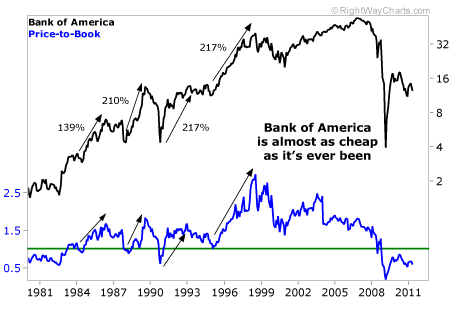| Home | About Us | Resources | Archive | Free Reports | Market Window |
These Stocks Will Soar During Bernanke's InflationBy
Monday, May 23, 2011
Federal Reserve Chairman Ben Bernanke needs banks to make a fortune.
Follow this chain of events, and you'll see what I mean...
The government desperately wants real estate to turn around. It desperately wants money to get in the hands of the people so they can take out mortgages on real estate. This will stabilize home prices and help get the economy going again.
How does the government get money in people's hands? Through banks lending it out.
After the real estate bust, banks got into bad shape. So the government wants to make it as easy as possible for the banks to get back in good shape.
How do you fix a busted bank? You make it really easy for it to make big profits. And by cutting interest rates to zero, that's exactly what Ben Bernanke has done. This way, banks can borrow for next to nothing and lend it out.
That's where we are today... The government is trying to make it easy for the banks to make money in the traditional way (borrowing at a low rate and lending at a higher one).
You might think with times as easy as they are for banks, bank stocks would have soared. But they haven't. Instead bank stocks are dirt-cheap...
The last time bank shares were this cheap was 1995... And bank stocks soared hundreds of percent in the next few years.
Actually, bank stocks are an even better deal today than they were in 1995... They are cheaper today, so they could have even more upside this time around.
Let me explain...
Our True Wealth Systems historical databases prove bank stocks experience incredible booms and busts. If you can catch a boom, you can make some serious profits.
Your odds for big profits improve if you can buy banks at a great value after a bust. But what is "great value"? How do you size up good value in bank stocks?
The simplest way to size up value in bank stocks is the price-to-book ratio...
A price-to-book ratio of "1" is typically close to a bank's liquidation value. History shows when you can buy banks close to this liquidation value, you're getting a good deal. On the flip side, when banks trade for two times book value and higher, they're getting expensive.
For example, take a look at Bank of America shares versus Bank of America's price-to-book ratio...
 The green line is a price-to-book ratio of 1. In the last 25 years, the best time to buy Bank of America was when it traded at a price-to-book ratio of 1 or lower. In each case, you made triple-digit gains in less than three years.
Right now, Bank of America is as cheap as it's ever been (except for the bust in 2008). With history as our guide, hundreds of percent gains are possible from here...
Another rough way to size up value in banks is by their price-to-earnings ratio... Today, banks are trading at a single-digit forward P/E ratio. Here are the top four holdings in the iShares Dow Jones U.S. Financial Sector Index Fund:
When you look over history, buying banks at a single-digit P/E ratio has been a great deal. The opportunity has only existed a few times – and it's always been a fantastic time to own banks.
The two biggest extremes are 1985 and 1991. And you can see in the Bank of America chart, those were good times to buy.
We have all three things we want to see in an investment...
Banks are cheap and hated... and they're the most direct beneficiary of Bernanke's actions. Bernanke likely won't be raising rates above zero for a year or more, so the good times to be a banker will continue.
You can still get in cheap now... The simplest way to invest is through the iShares Dow Jones U.S. Financial Sector Index Fund (IYF). Check it out...
Good investing,
Steve
Further Reading:
Steve found another sector where stocks are "as cheap as they've ever been," "hated by investors, who are fleeing," and, "according to True Wealth Systems, a new uptrend has begun." Get the full story before it's too late: If You Catch One of These Booms, You May Never Have to Work Again.
Steve used the same approach last November when he recommended three microcap funds to DailyWealth readers. The funds are up 14%, 17%, and 19% in six months. Read more here: A 91% Return Is the Norm Here... Our Gains Could Be Much Higher.
Market NotesNEW HIGHS OF NOTE LAST WEEK
Amgen (AMGN)... biotech bellwether
Yanzhou Coal (YZC)... Chinese coal giant
Rayonier (RYN)... "Ultimate Agriculture Investment"
Dell (DELL)... computers
Intel (INTC)... the engines that power computers
Lorillard (LO)... cigarettes
Altria (MO)... cigarettes
Philip Morris Intl. (PM)... our emerging market "basics" approach
Coventry Health Care (CVH)... health care
Aetna (AET)... health care
Medtronic (MDT)... champion dividend grower
Pfizer (PFE)... Big Pharma
Merck (MRK)... Big Pharma
Eli Lilly (LLY)... Big Pharma
Novartis (NVS)... Big Pharma
Sanofi-Aventis (SNY)... Big Pharma
General Mills (GIS)... Big Food
Kraft (KO)... Big Food
Pepsi (PEP)... Big Soda
Domino's Pizza (DPZ)... Big Pizza
Papa John's (PZZA)... Big Pizza
Yum! Brands (YUM)... a China play in drag
Darden Restaurants (DRI)... Olive Garden, Red Lobster
NEW LOWS OF NOTE LAST WEEK
Cisco (CSCO)... big, cheap tech
Hewlett-Packard (HPQ)... computers
OfficeMax (OMX)... office supplies
Staples (SPLS)... office supplies
Eagle Bulk Shipping (EGLE)... shipping
Excel Maritime Shipping (EXM)... shipping
Genco Shipping (GNK)... shipping
|
In The Daily Crux
Recent Articles
|
||||||||||||||

